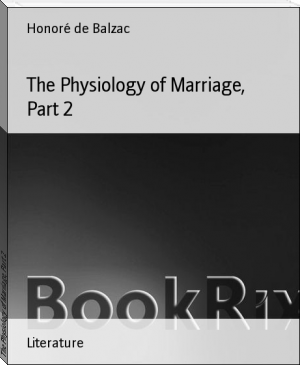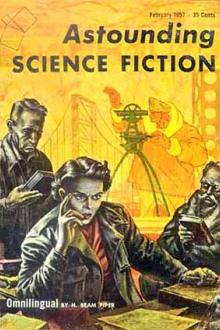The Physiology of Marriage, Part 1 - Honoré de Balzac (english novels to improve english .txt) 📗

- Author: Honoré de Balzac
Book online «The Physiology of Marriage, Part 1 - Honoré de Balzac (english novels to improve english .txt) 📗». Author Honoré de Balzac
DEDICATION
Notice the words: _The man of distinction to whom this book is
dedicated_. Need I say: "You are that man."--THE AUTHOR.
The woman who may be induced by the title of this book to open it,
can save herself the trouble; she has already read the work
without knowing it. A man, however malicious he may possibly be,
can never say about a woman as much good or as much evil as they
themselves think. If, in spite of this notice, a woman will
persist in reading the volume, she ought to be prevented by
delicacy from despising the author, from the very moment that he,
forfeiting the praise which most artists welcome, has in a certain
way engraved on the title page of his book the prudent inscription
written on the portal of certain establishments: _Ladies must not
enter_.
THE PHYSIOLOGY OF MARRIAGE;
OR,
THE MUSINGS OF AN ECLECTIC PHILOSOPHER ON THE HAPPINESS AND
UNHAPPINESS OF MARRIED LIFE
INTRODUCTION
"Marriage is not an institution of nature. The family in the east is entirely different from the family in the west. Man is the servant of nature, and the institutions of society are grafts, not spontaneous growths of nature. Laws are made to suit manners, and manners vary.
"Marriage must therefore undergo the gradual development towards perfection to which all human affairs submit."
These words, pronounced in the presence of the Conseil d'Etat by Napoleon during the discussion of the civil code, produced a profound impression upon the author of this book; and perhaps unconsciously he received the suggestion of this work, which he now presents to the public. And indeed at the period during which, while still in his youth, he studied French law, the word ADULTERY made a singular impression upon him. Taking, as it did, a prominent place in the code, this word never occurred to his mind without conjuring up its mournful train of consequences. Tears, shame, hatred, terror, secret crime, bloody wars, families without a head, and social misery rose like a sudden line of phantoms before him when he read the solemn word ADULTERY! Later on, when he became acquainted with the most cultivated circles of society, the author perceived that the rigor of marriage laws was very generally modified by adultery. He found that the number of unhappy homes was larger than that of happy marriages. In fact, he was the first to notice that of all human sciences that which relates to marriage was the least progressive. But this was the observation of a young man; and with him, as with so many others, this thought, like a pebble flung into the bosom of a lake, was lost in the abyss of his tumultuous thoughts. Nevertheless, in spite of himself the author was compelled to investigate, and eventually there was gathered within his mind, little by little, a swarm of conclusions, more or less just, on the subject of married life. Works like the present one are formed in the mind of the author with as much mystery as that with which truffles grow on the scented plains of Perigord. Out of the primitive and holy horror which adultery caused him and the investigation which he had thoughtlessly made, there was born one morning a trifling thought in which his ideas were formulated. This thought was really a satire upon marriage. It was as follows: A husband and wife found themselves in love with each other for the first time after twenty-seven years of marriage.
He amused himself with this little axiom and passed a whole week in delight, grouping around this harmless epigram the crowd of ideas which came to him unconsciously and which he was astonished to find that he possessed. His humorous mood yielded at last to the claims of serious investigation. Willing as he was to take a hint, the author returned to his habitual idleness. Nevertheless, this slight germ of science and of joke grew to perfection, unfostered, in the fields of thought. Each phase of the work which had been condemned by others took root and gathered strength, surviving like the slight branch of a tree which, flung upon the sand by a winter's storm, finds itself covered at morning with white and fantastic icicles, produced by the caprices of nightly frosts. So the sketch lived on and became the starting point of myriad branching moralizations. It was like a polypus which multiplies itself by generation. The feelings of youth, the observations which a favorable opportunity led him to make, were verified in the most trifling events of his after life. Soon this mass of ideas became harmonized, took life, seemed, as it were, to become a living individual and moved in the midst of those domains of fancy, where the soul loves to give full rein to its wild creations. Amid all the distractions of the world and of life, the author always heard a voice ringing in his ears and mockingly revealing the secrets of things at the very moment he was watching a woman as she danced, smiled, or talked. Just as Mephistopheles pointed out to Faust in that terrific assemblage at the Brocken, faces full of frightful augury, so the author was conscious in the midst of the ball of a demon who would strike him on the shoulder with a familiar air and say to him: "Do you notice that enchanting smile? It is a grin of hatred." And then the demon would strut about like one of the captains in the old comedies of Hardy. He would twitch the folds of a lace mantle and endeavor to make new the fretted tinsel and spangles of its former glory. And then like Rabelais he would burst into loud and unrestrainable laughter, and would trace on the street-wall a word which might serve as a pendant to the "Drink!" which was the only oracle obtainable from the heavenly bottle. This literary Trilby would often appear seated on piles of books, and with hooked fingers would point out with a grin of malice two yellow volumes whose title dazzled the eyes. Then when he saw he had attracted the author's attention he spelt out, in a voice alluring as the tones of an harmonica, _Physiology of Marriage_! But, almost always he appeared at night during my dreams, gentle as some fairy guardian; he tried by words of sweetness to subdue the soul which he would appropriate to himself. While he attracted, he also scoffed at me; supple as a woman's mind, cruel as a tiger, his friendliness was more formidable than his hatred, for he never yielded a caress without also inflicting a wound. One night in particular he exhausted the resources of his sorceries, and crowned all by a last effort. He came, he sat on the edge of the bed like a young maiden full of love, who at first keeps silence but whose eyes sparkle, until at last her secret escapes her.
"This," said he, "is a prospectus of a new life-buoy, by means of which one can pass over the Seine dry-footed. This other pamphlet is the report of the Institute on a garment by wearing which we can pass through flames without being burnt. Have you no scheme which can preserve marriage from the miseries of excessive cold and excessive heat? Listen to me! Here we have a book on the _Art_ of preserving foods; on the _Art_ of curing smoky chimneys; on the _Art_ of making good mortar; on the _Art_ of tying a cravat; on the _Art_ of carving meat."
In a moment he had named such a prodigious number of books that the author felt his head go round.
"These myriads of books," says he, "have been devoured by readers; and while everybody does not build a house, and some grow hungry, and others have no cravat, or no fire to warm themselves at, yet everybody to some degree is married. But come look yonder."
He waved his hand, and appeared to bring before me a distant ocean where all the books of the world were tossing up and down like agitated waves. The octodecimos bounded over the surface of the water. The octavos as they were flung on their way uttered a solemn sound, sank to the bottom, and only rose up again with great difficulty, hindered as they were by duodecimos and works of smaller bulk which floated on the top and melted into light foam. The furious billows were crowded with journalists, proof-readers, paper-makers, apprentices, printers' agents, whose hands alone were seen mingled in the confusion among the books. Millions of voices rang in the air, like those of schoolboys bathing. Certain men were seen moving hither and thither in canoes, engaged in fishing out the books, and landing them on the shore in the presence of a tall man, of a disdainful air, dressed in black, and of a cold, unsympathetic expression. The whole scene represented the libraries and the public. The demon pointed out with his finger a skiff freshly decked out with all sails set and instead of a flag bearing a placard. Then with a peal of sardonic laughter, he read with a thundering voice: _Physiology of Marriage_.
The author fell in love, the devil left him in peace, for he would have undertaken more than he could handle if he had entered an apartment occupied by a woman. Several years passed without bringing other torments than those of love, and the author was inclined to believe that he had been healed of one infirmity by means of another which took its place. But one evening he found himself in a Parisian drawing-room where one of the men among the circle who stood round the fireplace began the conversation by relating in a sepulchral voice the following anecdote:
A peculiar thing took place at Ghent while I was staying there. A lady ten years a widow lay on her bed attacked by mortal sickness. The three heirs of collateral lineage were waiting for her last sigh. They did not leave her side for fear that she would make a will in favor of the convent of Beguins belonging to the town. The sick woman kept silent, she seemed dozing and death appeared to overspread very gradually her mute and livid face. Can't you imagine those three relations seated in silence through that winter midnight beside her bed? An old nurse is with them and she shakes her head, and the doctor sees with anxiety that the sickness has reached its last stage, and holds his hat in one hand and with the other makes a sign to the relations, as if to say to them: "I have no more visits to make here." Amid the solemn silence of the room is heard the dull rustling of a snow-storm which beats upon the shutters. For fear that the eyes of the dying woman might be dazzled by the light, the youngest of the heirs had fitted a shade to the candle which stood near that bed so that the circle of light scarcely reached the pillow of the deathbed, from which the sallow countenance of the sick woman stood out like a figure of Christ imperfectly gilded and fixed upon a cross of tarnished silver. The flickering rays shed by the blue flames of a crackling fire were therefore the sole light of this sombre chamber, where the denouement of a drama was just ending. A log





Comments (0)